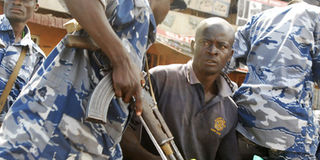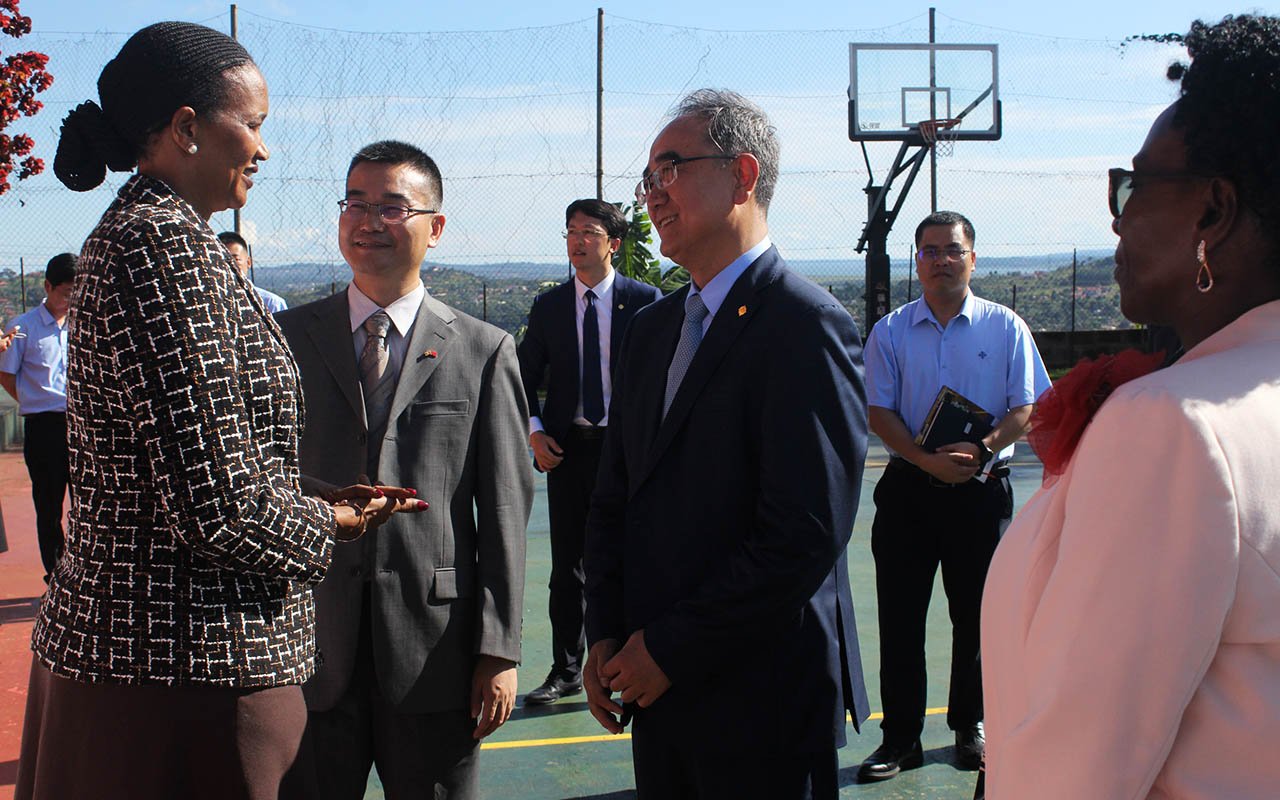Police smash walk to work demos, arrest 30

People scamper for safety after police fired live bullets and tear gas in Kampala yesterday. Thirteen people, including the organisers of the protests, were arrested. While addressing the nation on Sunday, President Museveni promised that police would arrest anyone involved in the protest. PHOTO BY STEPHEN WANDERA
What you need to know:
Textbooks and teargas. Riot police lob teargas canister into school as civil society again accuses Force of unnecessarily handling suspected protestors harshly.
NATIONWIDE
Teargas and gunshots yesterday rocked Kampala as police clashed with protestors who turned up for the second phase of the Walk-to-Work demonstrations.
Organised by pressure group Activists for Change (A4C), the protests, whose first phase began on April 11 leaving several people dead, maimed or detained by the security forces, are aimed at shedding light on the plight of Ugandans suffering due to high fuel and food prices and rising cost of living.
On Friday, the police chief, Maj. Gen. Kale Kayihura, warned A4C that any form of civil disobedience would not be tolerated, especially because students would be beginning their exams yesterday.
By press time, A4C said they had recorded 44 arrests of suspected protestors across the country although Police Deputy spokesperson Vicent Ssekate said only 29 people were in police custody.
Some activists were disappointed when by mid-morning yesterday Forum for Democratic Change (FDC) party president Kizza Besigye, Democratic Party (DP) president-general Norbert Mao and other senior opposition leaders were not participating in the protest.
Dr Besigye and most of the FDC senior leadership were most of yesterday engaged in a 2016 political strategy retreat that started on Sunday at Ridar Hotel in Mukono on how to win elections. Incidentally, Mr Mao and senior DP officials were also at the same hotel but at a separate meeting closed to the media.
Speaking at the retreat, Dr Besigye said he would walk to work today and insisted the protests would be peaceful.
Heavy security cordon around Besigye
“It is the police that cause violence during these demonstrations. The activists are simply walking to their places of work. It does not call for a procession. Parents should tell the police not to disrupt the exams of the students. It is the police who should ensure that the examinations are not disrupted. Not to teargas students and innocent peaceful protestors,” Dr Besigye said.
“They (police) are missing the point by having all that deployment and military hardware at my home. The problem is not Besigye, the problem is the conditions of the everyday person are extremely bad,” Dr Besigye added, referring to the heavy deployment at his home in Kasangati yesterday, where he had been expected to begin the walk.
There was heavy police deployment outside Ridar Hotel where the two political parties held their meetings. A water cannon truck and three police pick-up trucks carrying anti-riot police were deployed adjacent to the hotel.
Plain-clothed security operatives flocked the hotel and its surrounding. Three roadblocks were set up on the Kampala-Jinja highway from the Seeta area.
In Kampala, shops and other business remained closed in the central business district for most of the day as police faced-off in running battles with protestors at Kisekka Market where, police said, protestors built barricades and blocked traffic.
Military Police and other security personnel were heavily deployed and patrolled city streets all day amid heckling by protestors standing outside closed shops.
Makerere students march
In Wandegeya, more than 20 Makerere University students led by LC5 councillor Bernard Luyiga walked from the School of Education to the Central Police Station, where they demanded to know the whereabouts of their colleague, Allan Mutagubya, who was reportedly arrested on Sunday. There was a short confrontation with police.
The students were later allowed to walk to the High Court, where the officer in-charge of Makerere Police Post, Mr Julius Tusingwire, confirmed Mr Mutagubya was in police custody awaiting prosecution.
In Kololo, a teargas canister was lobbed into the Kololo High School compound where it exploded, releasing noxious fumes. Twenty students fainted due to the effect of teargas and were rushed to Mulago Hospital by a Red Cross team. By press time yesterday, three of the students were still on oxygen at Mulago.
The school’s deputy head teacher, Mr Ahmed Bagala, blamed the incident on “rioters” but also equally blamed the police for recklessness in executing their duties. “It is regrettable because this was done indiscriminately and it has caused confusion at the time when examinations are going on. But I blame it on hooligans,” Mr Bagala said.
Along the way to Kasangati in Kanyanya on Gayaza Road, police mounted roadblocks slowing traffic, prompting bitter exchanges between motorists, passengers on commuter taxis and the police.
Mpuuga no-show in Masaka
Kampala Metropolitan Police spokesperson Ibin Ssenkumbi, however, said the police presence in the area was prompted by protestors, who he said had blocked traffic. “We intervened to enable smooth flow of motorists,” Mr Ssenkumbi said.
In Masaka, activists were disappointed after the A4C national coordinator, Mr Mathias Mpuuga, who was expected to lead demonstrators, failed to show up.
There were also scuffles between police and boda-boda cyclists in Masaka town after an armoured police vehicle knocked a boda-boda cyclist.
According to eyewitnesses, the speeding armoured car rammed into a group of cyclists parked on the roadside near Masaka Secondary School roundabout.
-Reported by John Njoroge, Richard Wanambwa, Abdu Kiyaga, Ephraim Kasozi & Issa Aliga




